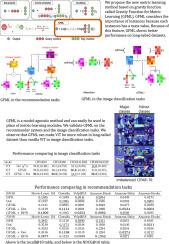GFML: Gravity function for metric learning
IF 7.5
2区 计算机科学
Q1 AUTOMATION & CONTROL SYSTEMS
Engineering Applications of Artificial Intelligence
Pub Date : 2024-10-28
DOI:10.1016/j.engappai.2024.109463
引用次数: 0
Abstract
Diverse machine learning algorithms rely on the distance metric to compare and aggregate the information. A metric learning algorithm that captures the relevance between two vectors plays a critical role in machine learning. Metric learning may become biased toward the major classes and not be robust to the minor ones, i.e., metric learning may be vulnerable in an imbalanced dataset. We propose a gravity function-based metric learning (GFML) that captures the relationship between vectors based on the gravity function. We formulate GFML with two terms, (1) mass of the given vectors and (2) distance between the query and key vector. Mass learns the importance of the object itself, enabling robust metric learning on imbalanced datasets. GFML is simple and scalable; therefore, it can be adopted in diverse tasks. We validate that GFML improves the recommender system and image classification.

GFML:用于度量学习的重力函数
各种机器学习算法都依赖于距离度量来比较和汇总信息。能捕捉两个向量之间相关性的度量学习算法在机器学习中起着至关重要的作用。公因子学习可能会偏向于主要类别,而对次要类别不具有鲁棒性,也就是说,公因子学习在不平衡的数据集中可能很脆弱。我们提出了基于重力函数的度量学习(GFML),它能根据重力函数捕捉向量之间的关系。我们用两个术语来表述 GFML:(1) 给定向量的质量;(2) 查询与关键向量之间的距离。质量学习对象本身的重要性,从而在不平衡数据集上实现稳健的度量学习。GFML 简单且可扩展,因此可用于各种任务。我们验证了 GFML 能改进推荐系统和图像分类。
本文章由计算机程序翻译,如有差异,请以英文原文为准。
求助全文
约1分钟内获得全文
求助全文
来源期刊

Engineering Applications of Artificial Intelligence
工程技术-工程:电子与电气
CiteScore
9.60
自引率
10.00%
发文量
505
审稿时长
68 days
期刊介绍:
Artificial Intelligence (AI) is pivotal in driving the fourth industrial revolution, witnessing remarkable advancements across various machine learning methodologies. AI techniques have become indispensable tools for practicing engineers, enabling them to tackle previously insurmountable challenges. Engineering Applications of Artificial Intelligence serves as a global platform for the swift dissemination of research elucidating the practical application of AI methods across all engineering disciplines. Submitted papers are expected to present novel aspects of AI utilized in real-world engineering applications, validated using publicly available datasets to ensure the replicability of research outcomes. Join us in exploring the transformative potential of AI in engineering.
 求助内容:
求助内容: 应助结果提醒方式:
应助结果提醒方式:


